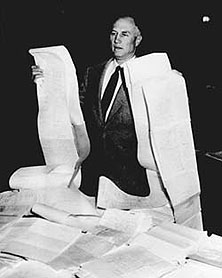 I happen to think the filibuster is unconstitutional. This is a minority view, and also a quixotic one since the Supreme Court will never allow itself to get involved in this, but I still think it’s true. So I was naturally happy to see Tom Geoghegan tilt at the filibuster windmill in the New York Times this weekend and lay out the constitutional argument explicitly. The filibuster, Geoghegan says, has probably always been unconstitutional, but in its current form, where no actual floor debate is required and it’s been morphed into a routine requirement for 60 votes to pass any bill, it’s super duper unconstitutional. He lays out three reasons:
I happen to think the filibuster is unconstitutional. This is a minority view, and also a quixotic one since the Supreme Court will never allow itself to get involved in this, but I still think it’s true. So I was naturally happy to see Tom Geoghegan tilt at the filibuster windmill in the New York Times this weekend and lay out the constitutional argument explicitly. The filibuster, Geoghegan says, has probably always been unconstitutional, but in its current form, where no actual floor debate is required and it’s been morphed into a routine requirement for 60 votes to pass any bill, it’s super duper unconstitutional. He lays out three reasons:
First, the Constitution explicitly requires supermajorities only in a few special cases: ratifying treaties and constitutional amendments, overriding presidential vetoes, expelling members and for impeachments. With so many lawyers among them, the founders knew and operated under the maxim “expressio unius est exclusio alterius” — the express mention of one thing excludes all others. But one need not leave it at a maxim. In the Federalist Papers, every time Alexander Hamilton or John Jay defends a particular supermajority rule, he does so at length and with an obvious sense of guilt over his departure from majority rule.
Second, Article I, Section 3, expressly says that the vice president as the presiding officer of the Senate should cast the deciding vote when senators are “equally divided.” The procedural filibuster does an end run around this constitutional requirement….
Third, Article I pointedly mandates at least one rule of proceeding, namely, that a majority of senators (and House members, for that matter) will constitute a quorum….It would be illogical for the Constitution to preclude a supermajority rule with respect to a quorum while allowing it on an ad hoc and more convenient basis any time a minority wanted to block a vote. Yet that is essentially what Senate Rule 22 achieves on any bill that used to require a majority vote.
So there you have it. An airtight case. Airtight if it were me writing majority opinions for the Supreme Court, anyway. While we wait for that glorious day, however, it’s just an opinion. But still a correct one.
POSTSCRIPT: And don’t even get me started on Senate holds. Did you know that the constitution requires Senate confirmation only of “Ambassadors, other public Ministers and Consuls, [and] Judges of the supreme Court”? All the rest of the confirmation circus is required only by statute, and can be changed anytime we want. And I say: change it. Restrict it to ambassadors, cabinet heads, Supreme Court and appellate judges, and a very small number of other top level agency officials (Fed chairman, SEC chairman, etc.). Leave the rest up to the president and let the Senate get on with more important business. And for God’s sake, let’s say goodbye to the Senate tradition — found neither in the constitution nor in law — of allowing a single blowhard senator to bring nominations to a halt just because he’s pissed off about some random personal crusade. This is no way to run a country.


















